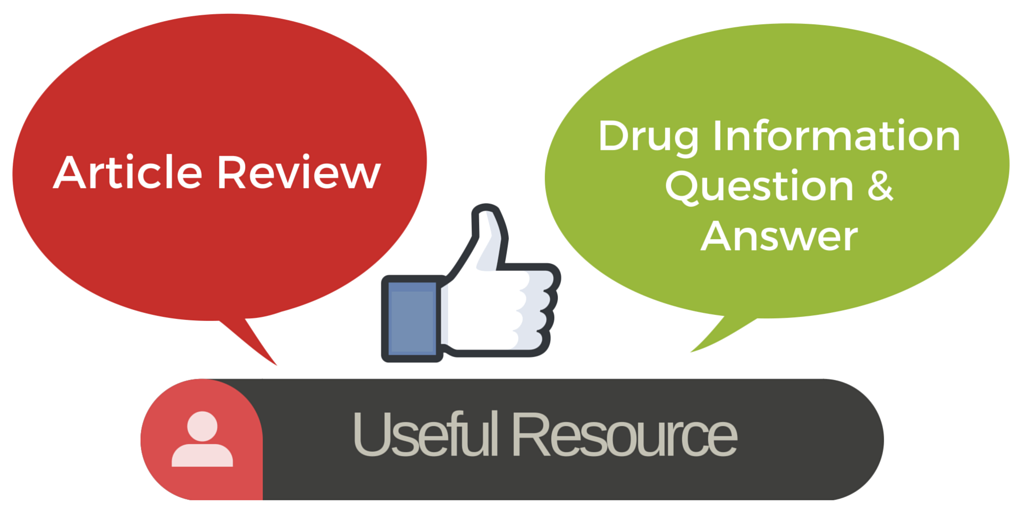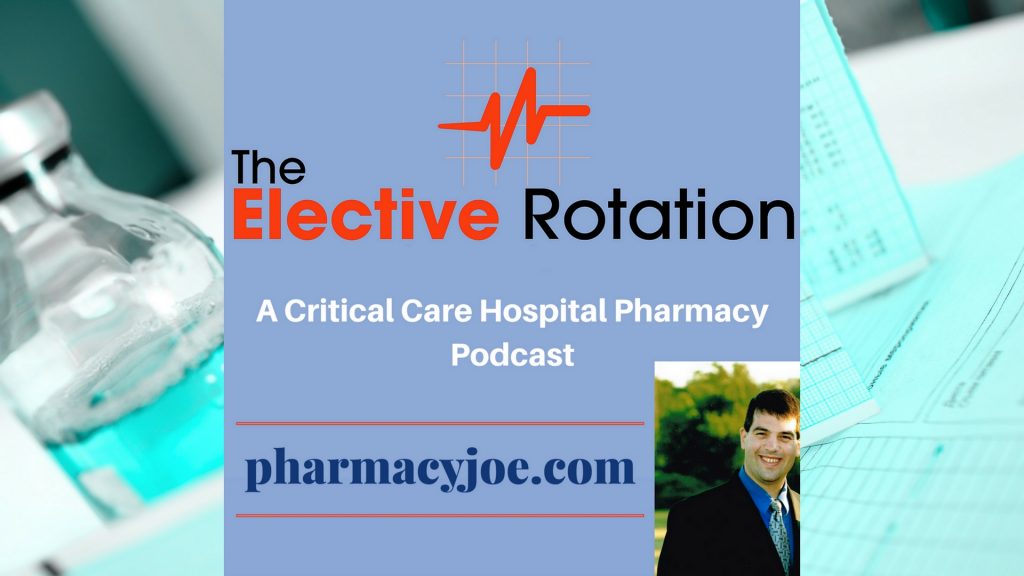In this episode I’ll: 1. Discuss an article about corticosteroids in septic shock. 2. Answer the drug information question “Which dose of vasopressin should be used in septic patients?” 3. Share a resource for residency and job interviews. Subscribe on iTunes, Android, or Stitcher Article Adjunctive Glucocorticoid Therapy in Patients with Septic Shock Authored by: […]
A free twice-weekly podcast where you can listen to critical care and hospital pharmacy information
Subscribe to the #1 ranked critical care and hospital pharmacy podcast, The Elective Rotation here:
Episode 265: How to dose magnesium sulfate to treat torsades
In this episode, I’ll discuss how to dose magnesium sulfate to treat torsades. Evidence for this episode linked here. If you like this post, check out my book – A Pharmacist’s Guide to Inpatient Medical Emergencies: How to respond to code blue, rapid response calls, and other medical emergencies. <– Previous Post […]
Episode 264: How a pharmacist can assess a critical care patient
In this episode, I’ll discuss how a pharmacist can assess a critical care patient. Subscribe on iTunes, Android, or Stitcher Making assessments of critically ill patients can be challenging for pharmacists since traditional pharmacy training does not necessarily incorporate much about patient assessment. The process I have developed for assessing critically ill patients from a […]
Episode 263: What makes ketamine different from other sedatives & analgesics used in critical care?
In this episode, I’ll discuss what makes ketamine different from other sedatives & analgesics used in critical care. You can get a referenced pdf of how to use ketamine for 6 different critical care indications in my free download area. Go to pharmacyjoe.com/free ketamine is number 13 on the download list. If you like this […]
Episode 262: Which vasopressor should be stopped first? Do patients with liver disease and prolonged PT/INR levels still need VTE prophylaxis? And a resource that reviews noteworthy Emergency Medicine articles from 2017
In this episode I’ll: 1. Discuss an article about which vasopressor should be stopped first. 2. Answer the drug information question “Do patients with liver disease and prolonged PT/INR levels still need VTE prophylaxis?” 3. Share a resource that reviews noteworthy Emergency Medicine articles from 2017. Subscribe on iTunes, Android, or Stitcher Article Vasoactive Agent […]
Episode 261: How to predict and confirm augmented renal clearance
In this episode, I’ll discuss how to predict and confirm augmented renal clearance. For a calculator to determine the ARC score and link to evidence supporting the prediction and confirmation of ARC go to pharmacyjoe.com/arc. If you are listening to this podcast before 10 pm EST on January 21, 2018, you can try out the […]
Episode 260: How to tell if a patient is about to be intubated
In this episode, I’ll discuss how to tell if a patient is about to be intubated. Subscribe on iTunes, Android, or Stitcher When a physician makes the decision to intubate a patient, there is a delay between the time they share the decision and the time the team is ready to facilitate intubation. The nurse […]
Episode 259: Is the interaction between metoclopramide and olanzapine significant?
In this episode, I’ll discuss the interaction between metoclopramide and olanzapine. For more on how I evaluate drug interactions go to pharmacyjoe.com/interactions If you like this post, check out my book – A Pharmacist’s Guide to Inpatient Medical Emergencies: How to respond to code blue, rapid response calls, and other medical emergencies. <– Previous Post […]
Episode 258: Higher vs. lower MAP targets, should a higher dose of heparin be used for VTE prophylaxis in obese patients, and a resource for patient education materials on sepsis
In this episode I’ll: 1. Discuss an article analyzing higher versus lower blood pressure targets for vasopressor therapy septic and vasodilatory shock. 2. Answer the drug information question “Should a higher dose of heparin be used for VTE prophylaxis in obese patients?” 3. Share a resource for patient education materials on sepsis. Subscribe on iTunes, […]
Episode 257: Preventing injection site pain from etomidate
In this episode, I’ll discuss preventing injection site pain from etomidate. Click here for the evidence discussed in this episode Click here for the free download discussed in this episode (it is #6 on the list) If you like this post, check out my book – A Pharmacist’s Guide to Inpatient Medical Emergencies: How to respond to […]
Episode 256: Angiotensin II for the Treatment of Vasodilatory Shock
Happy New Year! In this episode, I’ll discuss angiotensin II for the treatment of vasodilatory shock. Subscribe on iTunes, Android, or Stitcher The FDA recently approved synthetic human angiotensin II for use under the trade name Giapreza. After catecholamines and vasopressin, angiotensin II is now the 3rd class of agents approved for treating vasodilatory shock. […]
Episode 255: How to taper off steroids used for adrenal insufficiency in septic shock
In this episode, I’ll discuss how to taper off steroids used for adrenal insufficiency in septic shock: I have over 15 free downloadable resources for critical care and hospital pharmacists in my free download area. For immediate access to the complete list, go to pharmacyjoe.com/free. If you like this post, check out my book – A […]
- « Previous Page
- 1
- …
- 69
- 70
- 71
- 72
- 73
- …
- 93
- Next Page »



